Writer홍보협력팀
Tag
2021-09-23
View563


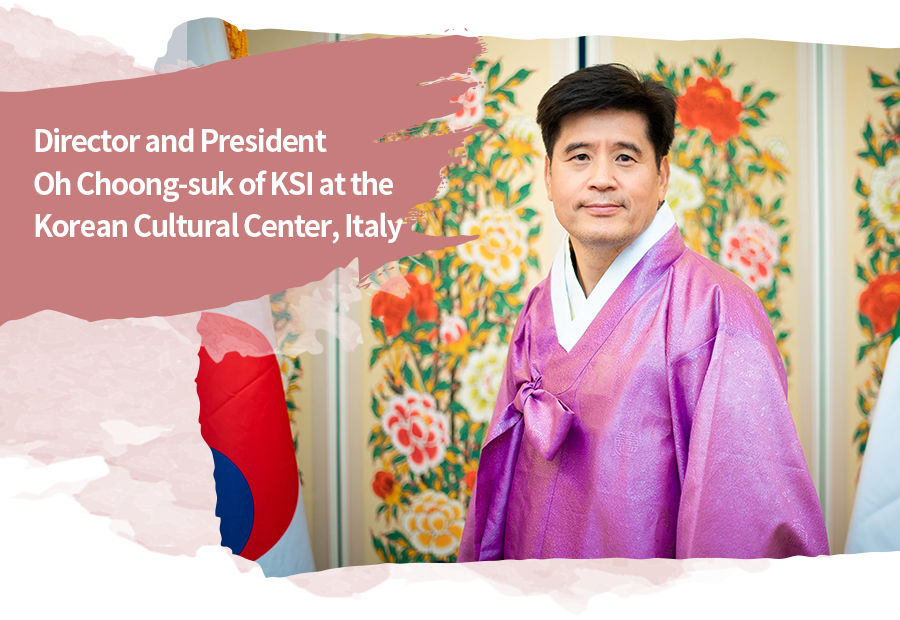
In 2016, the Korean Cultural Center, Italy, opened in Rome, a country with the roots of European history. King Sejong Institute started with the cultural center and has been working to spread the Korean language and culture for five years. Now that Korea’s status has risen and festivals under the theme of Korea are being held in local small towns, we have reviewed the path that the KSI at Korean Cultural Center, Italy has taken, and its future direction with Director and President Oh Chung-seok.
 I wonder what paths you’ve taken so far to become the director of the Korean Cultural Center and the president of KSI.
I wonder what paths you’ve taken so far to become the director of the Korean Cultural Center and the president of KSI.I was appointed as the director of the Korean Cultural Center, Italy, in February 2019. I also serve as the president of KSI established within KCC. I could sense that the status of Korea was gradually increasing while I worked in the Ministry of Unification in Korea. So I applied for the position of director of KCC. I had realized that spreading the Korean language and culture was more important than anything else.
In fact, I had served as the director of the KCC Philippines and as president of KSI for three years from 2014, before I came to KCC Italy. Serving as the director of KCC and the president of KSI twice, I feel more rewarded and happier every day.
At KSI established in a Korean Cultural Center, learners have the advantage of learning Korean language and culture through more diverse programs. For example, the learners at our institute can more easily access Korean language and culture through YouTube, Facebook, and Instagram of the KCC Italy. There are also opportunities for students to enjoy various Korean movies, performances, and exhibitions. They can also participate in events to show their skills, including Korean speech contests, writing contests, and Korean literature report contests. There are other classes to participate in, operated by the cultural center such as Korean food, Taekwondo, gayageum, etc.
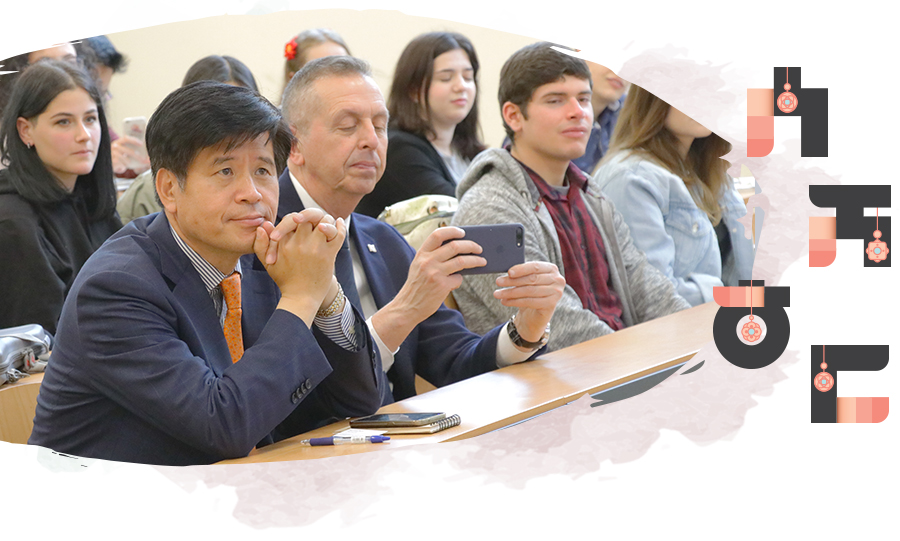
 How are Italian people’s thoughts on Korean language and culture changing?
How are Italian people’s thoughts on Korean language and culture changing?It's been about two and a half years since I was appointed to this job. Even during these times, I could feel that people’s perceptions about Korean language and culture was changing rapidly. I believe it is thanks to the power of Korean culture that is becoming so popular among people around the world, including BTS and movie director Bong Joon-ho.
Actually, the biggest reason why Italians became interested in Korea was the 2002 Korea-Japan World Cup. When the Korean team defeated the Italian team, the Italians (who had strong pride in their team) saw Korea in a different light.
The interest in Korea that started with the World Cup spread to films. After Director Lee Chang-dong won the Special Director Award at Venice Film Festival in 2002, various Korean movies are being introduced at the Florence Korea Film Fest. In 2004, director Kim Ki-duk received attention by winning the Best Director Award at the Venice International Film Festival. Korean movies are also continuously introduced through Udine Far East Film Festival, International Rome Film Festival, etc.
On the other hand, the recent interest in Korea among young people is not limited to Korean films. It is widening across the whole spectrum of Korean culture, including K-pop, Korean dramas, and Korean food. Last May, I was waiting in line in front of an exhibition hall in Florence while I was on a business trip. The ticket inspector came to me and asked something in Korean, to see if I was Korean. I was a little taken aback, because I was not expecting to be asked a question in Korean, in Florence, and by an Italian person. Later I found that he was teaching himself Korean because he was attracted to Korean culture. Also, last July, I was again greeted in Korean by an Italian person when I visited Atri in the eastern part of Italy. Atri is a small city, like Bongpyeong of Gangwon-do, Korea, and they have festivals every summer. This year, they had their festival on the theme of Korea. You can see that Korean culture is penetrating naturally into various corners of Italy.
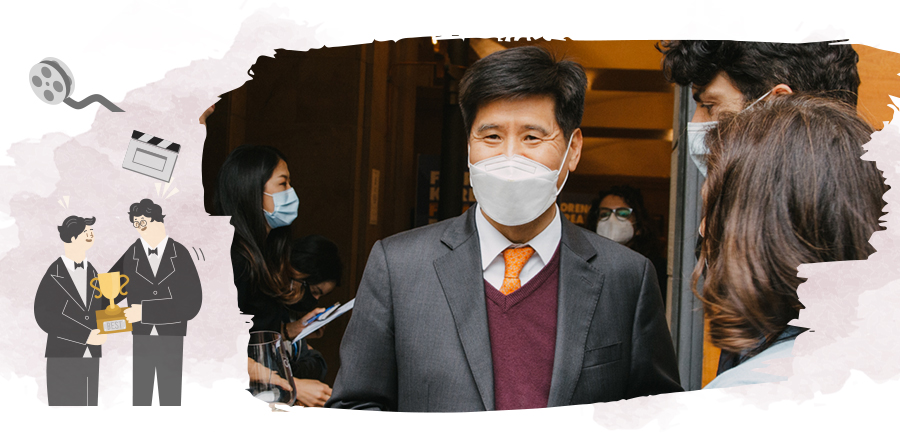
 What is the most memorable thing leading the KCC and KSI in Italy?
What is the most memorable thing leading the KCC and KSI in Italy?
It was February 2020. We needed a new dispatch of Korean teachers to our institute, but the Ministry of Foreign Affairs had stopped issuing visa notes to ordinary passport holders. Issuing visa notes to ordinary passport holders was not in the Ministry of Foreign Affairs regulations, and because they had done such a thing in the previous year, they were criticized for it in the annual government audit. Since Korean teachers who had regular passports could not get visa notes, they could not get visas from the Italian Embassy in Korea. This caused some alarm in our institute. We contacted the Ministry of Foreign Affairs immediately, emphasized the importance of dispatching teachers, and requested the issue of official passports to teachers. We believed that we were qualified to get official passports, since non-public officials such as KOICA, KOTRA, and the Tourism Organization have received official passports from them. In the end, the Ministry of Culture, Sports and Tourism and KSIF worked together to get the official passports issued to Korean teachers from 2021.
Through this event, we realized that it was important to improve the treatment and status of Korean teachers as the cultural center staff. We also requested the Ministry of Foreign Affairs in Italy to issue diplomatic visas for the cultural center staff, emphasizing that Korean teachers are also our staff. The Italian Ministry of Foreign Affairs accepted this request and now issues diplomatic visas to Korean teachers. Accordingly, the teachers working at our institute could also be vaccinated first, under the regulations for diplomats and administrative staff.
In order to spread Korean language and culture worldwide, the role of Korean teachers is most important. And I believe that my role is to provide the conditions necessary for them to work stably in the dispatched country. I was heartbroken to see the Korean teachers in other countries who had to go back to Korea last year and this year, not being able to get vaccinated in those countries. Meanwhile, our institute made a small effort to improve the treatment of our teachers to get them vaccinated first, and I felt rewarded.
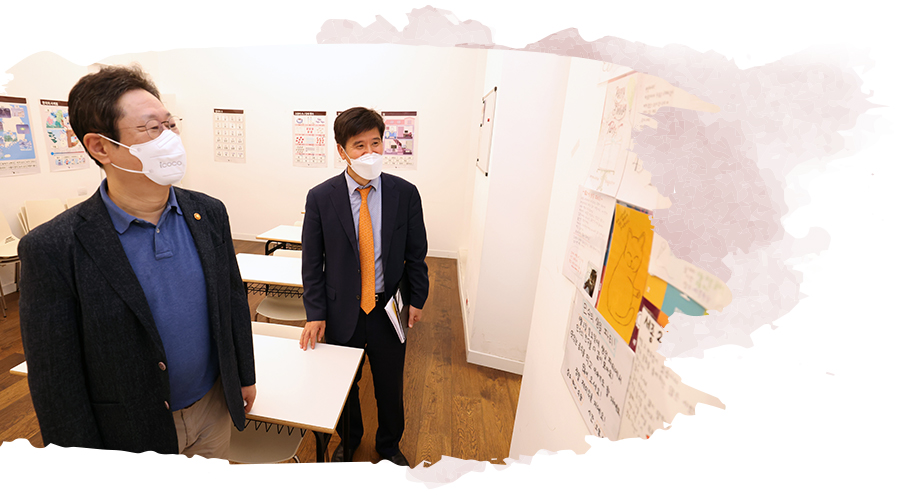
 What changed at the KSI at KCC Italy due to the spread of COVID-19?
What changed at the KSI at KCC Italy due to the spread of COVID-19?
The spread of COVID-19 was a crisis and an opportunity at the same time. For offline classes, only the residents of Rome could participate in learning. Also, classes were unavailable on weekends when the Center was closed. However, as we switched to online classes, we were able to open weekend classes, weekend intensive classes, and early morning classes that we couldn’t offer before, and learners from all over the country were able to participate. In fact, the number of learners in the spring semester of 2019 was around 170, but in spring 2021, the numbers increased significantly to 547.
We have also found the solution for communication problems between teachers and learners, and among the learners. We designated one student who spoke good Korean or English as the class president to facilitate communication. Students who could not understand everything the teacher said during the class can now understand through the class presidents.
Also, we think we’ll be able to have both online and offline classes, and we are developing study aids for learners who take offline classes. It enables students to write their names in Korean, and access the study programs at KSI. I hope students will find it useful.
 What is the role of the King Sejong Institute in the era where interest in Korean language and culture is spreading all over the world?
What is the role of the King Sejong Institute in the era where interest in Korean language and culture is spreading all over the world?
Interest in Korean culture is growing not only in Italy, but in many other European countries as well. The number of people who want to learn Korean is also increasing rapidly. I believe that King Sejong Institute also needs efforts and innovations to satisfy these demands. The most important would be the development of textbooks and videos, as well as securing of expert Korean teachers. From this point of view, it was a very timely decision that KSI started training localized teachers from this year.
In order to expand the dissemination of Korean in Europe in the long term, we need to persuade local middle and high schools to teach Korean as a second language. When I was working as the director of KCC Philippines and the president of KSI, I had made a proposal to the Ministry of Education in both countries. After some cooperation and coordination, we were able to institutionalize Korean education in local public middle and high schools in 2017. We asked the dispatched teachers of KSI at the time to train local teachers to teach Korean. The local teachers who completed training started teaching Korean in middle and high schools from 2018. Thanks to that, about 4,000 students in schools in the Philippines have taken Korean language classes by 2020. This year, a total of 52 schools in the Philippines will adopt Korean as their second language class. I hope that European middle and high schools will adopt Korean as a second language as soon as possible and increase the number.
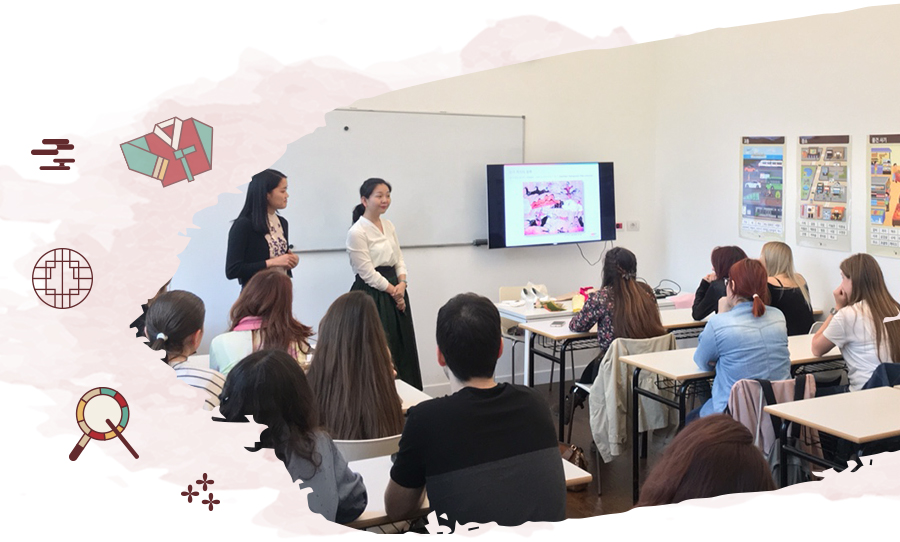
 Do you have anything to say to the students and staff of KSI around the world?
Do you have anything to say to the students and staff of KSI around the world?
To me, KSI is the "fastest plane" that leaves for Korea that people in the world can take. You will see Korea as soon as you enter KSI from anywhere in the world. I hope the learners can utilize KSI to get closer to Korea; it can be used in dozens and hundreds of ways, just like your smartphones.
Lastly, I would like to ask KSIF to always pay close attention to the opinions of presidents and dispatched teachers working in the frontline. Currently, KSIF is making changes in various ways, including selection of teachers, management of local teachers, improvement of treatment, textbook development, as well as selection of new KSI locations, and the progress is good. I would like to take this opportunity to express my gratitude to President Kang Hyounhwa, who has led these changes and achievements. I hope that we will continue to communicate and cooperate to move forward in a more progressive direction.